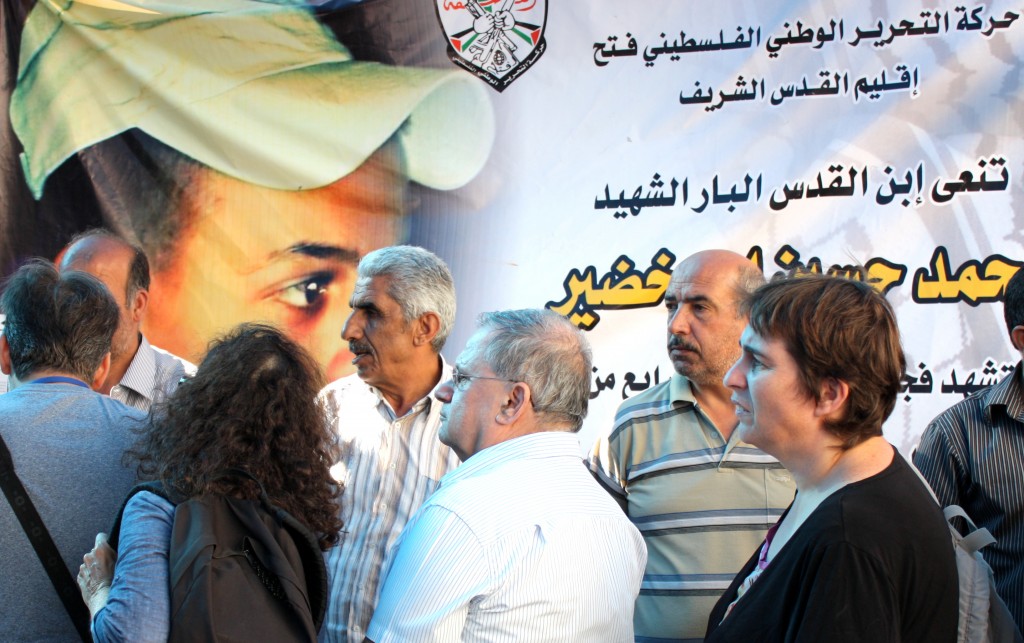
- Members of the family of Muhammad Abu-Khdeir receive Israeli visitors who came to share in their grief in the Palestinian neighborhood of Shuafat in Jerusalem. (Photo © Gershom Gorenberg)
My latest column is up at The American Prospect:
The air-raid silence sounded at three minutes to ten at night in Jerusalem. Two distant booms followed. Afterward, they seemed like an orchestral finale: abrupt, followed by silence, the only notes of a long day that were unmistakable in their meaning.
That afternoon, I’d gone with busloads of Israelis to Shuafat, a Palestinian neighborhood of East Jerusalem, to visit the family of Muhammad Abu-Khdeir. A huge mourners’ tent had been set up: The ceiling was made of blue tarps; one side was open to the street; the other three sides walled with tapestries and printed banners showing pictures of Muhammad. In the pictures, Muhammad looked very young for 16, his age last week when, on his way to Ramadan prayers, he was pulled into a car and doused with gasoline, murdered by immolation. The suspects, now in custody, their names still under a gag order, are six young Israelis from the Jerusalem area. The motives were revenge and hatred—call it national, or ethnic, or tribal.
Here’s the very brief timeline: On June 30, Israeli troops found the bodies of three Israeli teens—Eyal Yifrah, Gilad Shaar, and Naftali Fraenkel—who’d been kidnapped by Palestinian extremists while hitchhiking in the West Bank. The next afternoon, as their funerals were broadcast on national TV and radio, downtown West Jerusalem became a riot zone. Bands of angry Jews, most in their teens, virtually all male, chanted “Death to Arabs!” They tried to beat up Palestinian workers in the open market, and threw stones at cars, randomly, without any sign that they cared whether the driver was Jewish or Arab. Before dawn the next day, Abu-Khdeir was abducted and murdered.
The police, who responded too slowly to seething mobs in West Jerusalem, overreacted with rubber bullets and clubs to seething protests that broke out in East Jerusalem after the murder. A city divided by nationality and nationalism, half under occupation, which is also a city bound together by thin threads of human connections—a city much more lovely in its confusion of cultures, religions and languages than political reporters (including this one) ever get across—came undone.
Then, over the weekend, the police arrested six suspects in the Abu-Khdeir murder. According to official and unofficial leaks, they are not from ideological settlements but from the long-ignored fringe of ultra-Orthodox society, the dropouts from life-long religious study who have no job skills and not a sliver of a chance of fitting into any society outside the self-imposed ultra-Orthodox ghetto. A preliminary pathological report showed that Muhammad Abu-Khdeir had been burned alive.
The Israeli anti-racism coalition Tag Meir (translating the name would require a separate article) contacted the Abu-Khdeir family, which agreed to receive a group of Israelis in the mourning tent. There was room in the tent for 350 people. An announcement went out Monday; a few hours later, registration closed. Hundreds more wanted to come.
And so, on Tuesday afternoon, a dozen or so middle-aged men from Muhammad Abu-Khdeir’s family, including his father, stood in a receiving line in the tent as the visitors filed by, shaking their hands. “God bless you,” one of the relatives murmured in Arabic-accented English. “I am so sorry,” a woman murmured in Hebrew-accented English. Mostly, the ceremony was silent. The statement by both sides, it seemed, was to be there.
The visitors did not fit Israeli political divisions or stereotypes. According to the signals, explicit or subtle, of how people dress, as many as half were Orthodox. I saw familiar left-wing activists, as well as Daniel Gordis, vice-president of Shalem College and a sharp critic of the pro-peace camp. A woman in her 20s named Goldie told me that she lived over the Green Line—that is, in a settlement. She’d come, she said, “because I simply felt terrible” about the murder. Rabbi David Bigman, one of the heads of the Ma’ale Gilboa yeshiva (Talmudic seminary) and a forceful liberal Orthodox voice, told me with blunt sadness: “Because we can’t do anything else, we’re doing this, mostly for ourselves.” Of clergy and spokespeople for the right who have made vengeance a value, Bigman said, “There’s no basis for that in Judaism.” …
Read the rest here.





